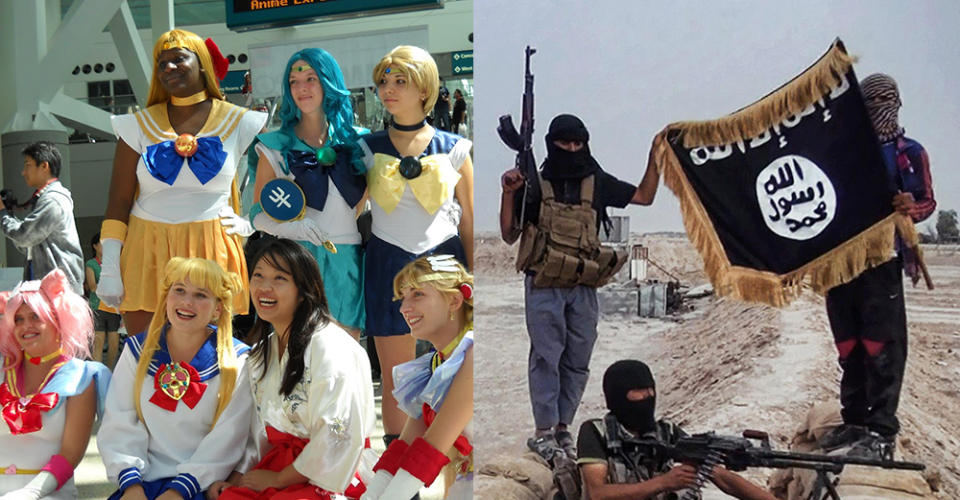Fans and fanatics are everywhere. On the one hand, sci-fi, fantasy and geek culture have become cool while social media’s amplified the voices of fans to create to make or break companies and even political movements. On the other hand, the Internet’s become a hotbed for the proliferation of extremist worldviews. In the middle, lies a grey space of hacktivists, framed as terrorists by some and championed as freedom fighters by others. So, what is a fan versus a fanatic, and just how do they relate to what is considered “normal”?
What’s the difference?
Katya (fan of fantasy and sci-fi): First off, who’s a fan, who’s a fanatic, and who’s normal? Let me throw out some ideas:
Joan of Arc: celebrated yes. But really…isn’t she a fanatic?
Elliot Rogers: misguided and lost. An initial fan of pickup artists. But became a fanatic since he went on a violent rampage.
ISIS: we love to think of them as fanatics but they’re very calculated, as are all religious extremists. They’re not madmen charging into battle frothing at the mouth. They have strategy and organization, typically, better than local government soldiers.
LOTR and HP readers: fans, generally.
Cosplayers: fans think they’re fans, society likes to think they’re a bit fanatic or freakish (another loaded word).
Julian Assange: freedom fighter, terrorist or fanatic hacker?
#GamerGaters: campaigners for more objective press, bullies or women-hating fanatics?
Tea Party: the bastion of moral integrity or looney politics?
Sports fans: fans…except when they’re being hooligans and hurling abuse at each other.
Screaming girls: they’re the best intentioned fans but are usually described by media as “fanatic” and indeed would inadvertently end up tearing a celebrity to pieces in their enthusiasm.
“Society”: we’re supposed to be the arbiter of normality but we also love a good witch hunt.
Joy (fan of fantasy and dark comics): What is “normal,” anyhow? I’d argue it’s an illusion, maintained by people obsessed with conforming to some false social stereotype of normality.
Manjula (mega fan of LOTR): And, really, there is no universal notion of what is ordinary. Looking at the boundaries of “mainstream” and “niche” or “weird” tells us more about the cultural norms of people who are defining them. There isn’t some kind of absolute reality of being inside or outside the norm.
Real fanatics
Katya: Yet people do still distinguish between fans and fanatics, ourselves included, and we each seem to have a notion of what constitutes one and not the other. Are you a fan so long as you indulge an interest without hurting others? Do you become a fanatic once your thoughts, speech and action turn toward harming others?
Manjula: I verge on the fanatical when I think that what I believe is the right and only way. It’s the desire to turn a personal reaction into some sort of cultural activity—either by sharing with friends or family or by joining a wider community that shares similar thoughts—and again imposing these thoughts on others.
I would argue that this is what happened with #GamerGate—what in fandom would be called a “flame war.” For the members of #GamerGate, being a member or fan(atic) of this so-called movement transcends a merely personal, one-to one relationship with the gaming community. You can see that #GamerGate fan(atic)s cluster in tight communities such as 8chan. These #GamerGate fan(atics) may have self-imposed codes regarding their so called “community” which seem totally outside our norms. The angry polemical, almost “extremist” #GamerGate 8chan forum board members see themselves as the legitimate watchdogs of the gaming community.
They don’t see themselves as defacing gaming, in fact #GamerGate fan(atic)s conceive of themselves as fierce protectors of the gaming world and crucial in the fight against its debasement/dumbing down by “female social justice warriors.” Ironically they view themselves as defending and understanding the heart and soul of gaming, even as they manipulate and harm other people (i.e., female game designers, critics and their supporters).
Joy: #GamerGate, in my mind, is very straightforward fanaticism. And that almost makes me want to categorize “fanatic” as all about harming or imposing on others…but, then again, I’m not sure. After all, people are often categorized as “fanatics” for what are really very solo pursuits. I think the distinction has more to do with obsession, with a real or perceived lack of control or balance. There has to be an element of addiction, of inability or refusal to quit or leave aside the object of your fandom.
Katya: In that case, are there things in common between someone who dresses up as a Sailor Moon character and a Neo-Nazi? You can argue that there are people in either group who get so deep into their imagined worlds that it becomes more real than the real world.
Joy: For one, most people hardcore into Sailor Moon don’t harbor any illusions that it is representative of the world in which they live, nor have any intention of trying to change their world in order to align more closely to this fantasy. Neo-Nazis on the other hand, have an off-kilter understanding of reality, and likewise want to mold their world to more fully align with their fantasy.
Manjula: I think it has to do with impacting the “real’ world. Someone who is a fan would not do violence in the real world. Say, a fan of ISIS would like their horrible outputs on Twitter, but a “fanatic” would actually go and fight for them, trying to impose their interpretations of the world directly on others who don’t share it.
Katya: So who gets to say what the “real world” is and the impact of something on it? #GamerGaters say they’re on a crusade to bring ethics to gaming journalism. I say they’re using rhetoric to justify bullying women because they adhere to a fucked up belief that the world is out to get them and women are inferior. Who’s right?
Presumably Elliot Rogers was “harmless” when he was typing away at his Manifesto, but when he began shooting, he’d crossed the line. Yet what about before that, when he posted rants to Youtube but there were no physical actions. And what about when your reputation gets destroyed, as was the case with Kathy Sierra, or when you receive threats of rape and murder? No harm to your actual physical body, but so much psychological and social damage.
Joy: I almost want to say that it’s something about the way that some discourses are more violent than others, because they interact with material systems of oppression. So actually, Manjula, I might lump a superfan of ISIS, even if they limit themselves to online, into the fanatic group. That’s why some Neo-Nazi ranting online is much more troubling than someone who pledges their allegiance to Spock. Because the vitriol of #GamerGate is reinforcing a system of patriarchy in which we all live our lives.
Everyday fanaticism
Katya: So what about fan/atical behavior that’s not so outwardly “violent” but that does still impact culture. The bohemian artists at the turn of the 20th century for example, like Baudelaire, who saw their lifestyle as a work of art and set cultural taste. The hippies of the 60s and 70s who normalized sex and drugs as a lifestyle. The corporate types today, myself included (see “Embracing the Passionless Life“), who are fanatics about work, status and the ego, couched as “progress,” “lifestyle,” and “individuality.”
Joy: It’s about our ideologies and what we believe creates a functional person. Fanatical obsession with work bleeds nicely into a capitalist market logic, and obsessive marathon training dovetails with ideas about what constitutes “health.”
Things that are more for fun and self-indulgent, especially when still somewhat stigmatized as counter-culture (video games, graphic novels, fantasy/sci-fi), don’t fit within these narratives.
Freaks: The real taboo
Katya: In that case, are we all fan/atics?
Manjula: I think we can all be fans! But we should verge away from being fanatics—to me, fanatics are people who attempt to legitimize their own narratives, by creating rules to be strictly observed by communities.
Katya: Well, let me move it from fans and fanatics to freaks. Writing about Michael Jackson, African-American writer James Baldwin, says:
“Freaks are called freaks and are treated as they are treated – in the main, abominably – because they are human beings who cause to echo, deep within us, our most profound terrors and desires.”
I feel that society’s pretty keen to slap labels such as “freak” or “fanatic” on people, to externalize and identify what we fear in ourselves, and to lock it up in someone else’s body.
Joy: That’s exactly right. The distinction between “fan” and “fanatic,” or between “fanatic” and “freak,” depends on who is telling the story. It has a lot more to do with the insecurities and phobias of who is slapping down the label.
“Fan” versus “fanatic”? That one we can discuss, theorize, try to wrap our heads around. “Fanatic” versus “freak”? That’s more concerned with social control, and disciplining the aberrant out of society because we’re afraid that we’re implicated in it.
Tags: extremism fandom feminism identity politics social expectations
























0 Comment